Wrapping Up Reeling 2023

The 41st annual edition of Chicago’s Reeling International LGBTQ+ Film Festival is now in the books, having featured an array of narrative, documentary and short films in theaters and online. The event featured a strong lineup of offerings, even though I didn’t screen as many films as I have in past years. In all, I managed to catch nine films during the festival’s two-week run. So, with that said, here’s my take on what I watched and what I thought.

“Kenyatta: Do Not Wait Your Turn” (USA)
(5/5); Letterboxd (5/5), Imdb.com (10/10), TMDB.com (5/5); Web site Trailer
In an age when politicians on both sides of the aisle are increasingly being seen as incompetent, self-serving and inauthentic, it’s refreshing to learn about one who apparently defies all of those traits. And viewers can now learn more about this inspiring individual in director Timothy Harris’s excellent debut documentary feature, a profile of Pennsylvania State Representative Malcolm Kenyatta (D), the first openly gay person of color to serve in the Commonwealth’s statehouse. The film focuses on Kenyatta’s 2022 run for the US Senate, a campaign fraught with financial difficulties, exaggerated questions of electability, biased punditry and media coverage, and a lack of support from his own party’s officials, including in his home district of Philadelphia. Nevertheless, these obstacles did not stop Kenyatta from soldiering on with his own style of out-and-proud, shoot-from-the-hip style of politicking, especially against his two better-known, better-financed Caucasian opponents. But, the election aside, one of the great strengths of this film is its examination of his upbringing and his life outside of politics, most notably his loving relationship with husband Matthew Jordan-Miller Kenyatta. By doing this, the filmmaker shows how Kenyatta’s personal life has shaped his policies and the apparent authenticity of his message, one driven by compassion, heartfelt sincerity and a growing intolerance of a system that seems hellbent on preserving a status quo that’s ever more exclusionary than not. This well-balanced, superbly integrated approach makes for excellent documentary filmmaking, giving audiences a comprehensive view of its subject and reason to see why he could easily be looked on as a rising star in American politics, one who speaks for many who don’t feel that their voices are being heard by the current establishment. Executive Producer Al Roker and his colleagues have created an insightful, uplifting watch, one that may actually give us some bona fide hope for the future of the nation’s politics – not to mention the nation itself.

“A Big Gay Hairy Hit! Where the Bears Are: The Documentary” (USA)
(5/5); Letterboxd (4.5/5), Imdb.com (9/10), TMDB.com (4.5/5); Web site Trailer
So you think all of the world’s bears are in zoos or in the wild, right? Well, if you visit any venues or neighborhoods frequented by gay men, you just might find yourself in the company of another pack of ursine creatures – Bears – one of the largest and least-known constituencies of the LGBTQ+ community. Consisting of predominantly big, burly, bearded, hirsute males (many of whom are best compared to modern-day lumberjacks), the Bear community’s numbers have swollen since their emergence in the late 1980s/early 1990s. But they’ve often gone unnoticed, both by society at large and even in LGBTQ+ circles – that is, until the premiere of an internet TV series known as Where the Bears Are. As an impromptu project dreamed up by a trio of seasoned entertainment industry professionals who were between gigs, the long-running series, which launched in 2011, is best described by its creators as a cross between The Golden Girls and Murder, She Wrote with a cast of big, fat, bearded gay guys. This bawdy, campy, outrageous internet TV show quickly became an unexpected sensation, partly for the quality of its product but also because it filled a niche for an otherwise-largely unserved audience, success that enabled this surprise hit to air for seven seasons. Director Eduardo Aquino’s excellent new documentary tells how the show came into being, including a look at its creators’ impressive movie and TV background. But the film also examines what it’s like to produce a seat-of-one’s-pants video project on a shoestring budget with a ragtag crew of artists who are in it primarily for the sheer enjoyment that they get out of their work. It also shines a bright light on the uplifting impact the show has had on body and attitude positivity for gay men who don’t exactly fit the commonly held twink, leatherman and gym bunny stereotypes often associated with them. And it accomplishes all this with a briskly paced, no-nonsense, economical, insightful and highly entertaining approach, truly a fine example of what a good documentary should do. This one is a lot of fun and highly informative, particularly for those who’ve never been introduced to the show or to the raucous, sensual, fun-loving segment of gay society that it so fittingly represents. Two paws up!
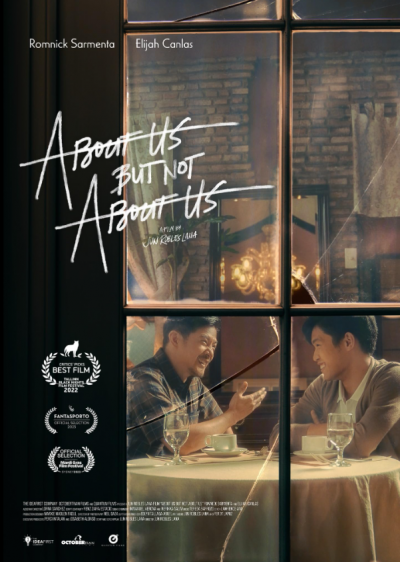
“About Us But Not About Us” (Philippines)
(5/5); Letterboxd (4.5/5), Imdb.com (9/10), TMDB.com (4.5/5); Web site Trailer
How well do we really understand the situations we find ourselves in? Most of us probably think we have a pretty good handle on them much of the time. But, when a gay, middle-aged Filipino college professor (Romnick Sarmenta) meets with one of his students (Elijah Canlas) whom he hasn’t seen for a while but toward whom he had shown preferential, nurturing treatment at one time, what starts out as a pleasant lunchtime reunion slowly turns into a series of troubling eye-opening revelations. Told through what seems like a seemingly innocent, somewhat innocuous conversation between the duo, writer-director Jun Robles Lana’s latest opens like a latter-day version of “My Dinner with Andre” (1981) but slowly turns unexpectedly dark, sinister and Hitchcockian, shedding a whole new light on the now-surprisingly deceptive opening act. As a result, what starts out as a seemingly harmless, slightly tedious encounter becomes engrossingly captivating as the true nature of each of the characters is revealed. The picture’s multilayered narrative grows ever more absorbing the further it plays out, showing us just how easily it can be for us to be deceived by circumstances, including in situations where we think we know the score but don’t. It also presents viewers with an intriguing look at how we can be mirrors of one another but never recognize the similarities until they’re squarely shoved in our face. (And who would have thought that watching two people eat a meal and talk could be so engaging?) “About Us But Not About Us” is a delicious little cinematic nugget that will likely leave audience members’ mouths agape by picture’s end, especially when looking back at how things start out and how they eventually wind up, putting a delightfully surprising spin on the film’s skillful incorporation of ambiguously cynical elements whose meanings don’t become fully apparent until the credits roll. Don’t be quick to give up on this one; it’s worth the wait to see what it delivers – and how well it does so.
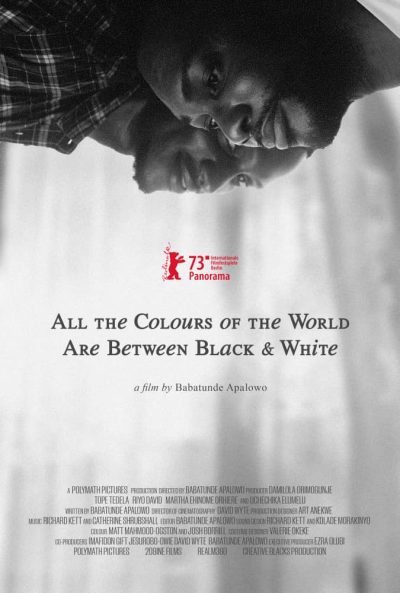
“All the Colours of the World Are Between Black and White” (Nigeria)
(4/5); Letterboxd (4/5), Imdb.com (8/10), TMDB.com (4/5); Web site Trailer
Despite the considerable social progress that the LGBTQ+ community has made in recent years, there are still some places around the world where the act of coming out is questionable and deeply troubling. In some cases, such a step raises serious issues about social acceptance, as well as self-preservation and legal ramifications. It may even prompt some individuals to doubt their genuine intuitive impulses about their natural inclinations just to be able to fit in. Such is the case in Nigeria, as depicted in the debut feature from writer-director Babatunde Apalowo, a Nigerian-born filmmaker based in the UK. In his first feature release, Apalowo tells the story of Bambino (Tope Tedela), a motorcycle deliveryman who meets and befriends Bawa (Riyo David), an aspiring photographer with whom he starts spending considerable time, a connection that carries implications greater than just friendship. However, given the country’s social taboos and illegality considerations, as well as sustained pressure from Efeyinwa (Martha Ehinome Orhiere), a neighbor who wants to become Bambino’s wife, the budding relationship between the two men remains at arm’s length. Bambino has doubts about his own sexuality, while Bawa believes that he and his new companion are destined for something deeper and more meaningful. But will that happen? The film probes this question as the two men tenuously circle one another, trying to figure out what’s next. Admittedly, the pacing here can be somewhat on the slow side at times, but that’s understandable given the circumstances under which they’re operating. But, by taking this approach, the filmmaker has an opportunity to present their story in a highly sensual way, one that creates ample sexual tension that’s fittingly augmented by the picture’s carefully framed shots, many of which allow the actors to convey tremendous depth of feeling merely with facial expressions and body language. The tone, message and style of filmmaking are all reminiscent of filmmaker Barry Jenkins’s Oscar-winning best picture “Moonlight” (2016), a perspective that carries significant ramifications in a culture that often denies the very existence of gay male individuals within its ranks. The film thereby provides a revelatory look into a segment of society that many don’t recognize, understand or acknowledge. Like this film’s American counterpart, however, it’s imperative that viewers have patience with this one, giving it time to develop and emerge with a story that’s heartfelt, eye-opening, and, above all, rewarding.
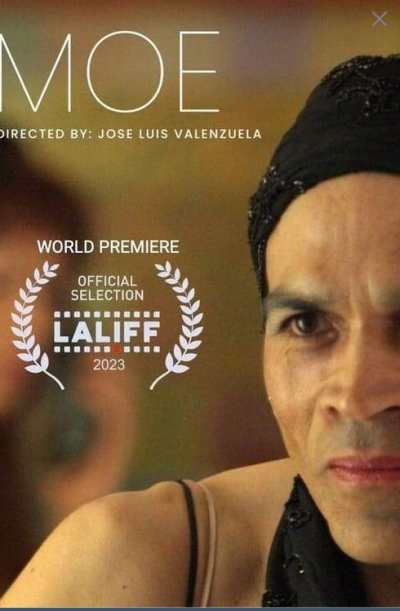
“Moe” (USA)
(4/5); Letterboxd (3.5/5), Imdb.com (7/10), TMDB.com (3.5/5); Web site Trailer
When Moises (a.k.a., “Moe”) (Sal Lopez), a gay theater director dying of AIDS, decides to throw a final farewell party for himself, things don’t quite turn out as planned. Surrounded by family (Tonantzin Esparza), longtime friends (Geoffrey Rivas, Danny De La Paz, Lucy Rodriguez) and an ex-wife (Evelina Fernández) whom he hasn’t seen in 15 years, this would-be celebration of life turns somewhat troubling with the revelation of long-hidden truths, a time for the release of secret pains, but also an opportunity for closure and redemption as the end draws near. As Moe’s story unfolds, the film takes on the character of a life review, with flashbacks that touch on his past, often “hosted” by his alter-ego, Lupe (Richard Coca), a drag queen cabaret chanteuse. Based on the award-winning stage play Dementia and filmed in 2005, director José Luis Valenzuela has at last been able to bring his long-held cinematic dream to the screen in a touching yet sometimes gut-wrenching tale filled with plenty of heartfelt moments and more than its share of biting wit. In some ways, the film plays like a gay version of “All That Jazz” (1979) with occasional touches of “Torch Song Trilogy” (1988) and “Angels in America” (2003) thrown in for good measure but without becoming shamelessly duplicative. Admittedly, the picture turns a little too melodramatic for its own good at times in the final act with the exposure of a few too many revelations that stretch the narrative’s credibility. A few production glitches show up now and then, too, detracting from the overall quality of what’s obviously a surprisingly well-made shoestring budget production. Otherwise, though, “Moe” is clearly a labor of love brought to life about a time when life itself is coming to an end, a story that’s economically told without becoming schmaltzy, manipulative or unduly campy in the process, which it easily could have been if left in less-skilled directorial hands. This offering may not be particularly easy to find, but it’s worth a look if the opportunity presents itself.

“Fireworks” (“Stranizza d’amuri”) (Italy)
(3/5); Letterboxd (3/5), Imdb.com (6/10), TMDB.com (3/5); Web site
Intolerance against members of the gay community has long been a theme in LGBTQ+ cinema, one that has become so common that it’s indeed familiar, if not overdone. However, when it’s set in a historical context, it can be valuable for illustrating how far this segment of society has come (and in a relatively short time, too), as well as a legacy instructional tool for younger members of the community. Such is apparently the intent behind writer-director Giuseppe Fiorello’s debut feature, a sincere effort at telling the fact-based story of a pair of teenage gay men (Gabriele Pizzuro, Samuele Segreto) in 1982 Sicily who face growing prejudice and harassment from locals and family members as their relationship begins to surface publicly. It’s a bittersweet heart-tugging tale of friendship, love, courage and undue bigotry that genuinely strikes a chord of sympathy with viewers. However, with a runtime of 2:13:00, it’s also needlessly long, especially at the outset, moving by at a snail’s pace that begins to grow tiresome by the film’s middle. The film also suffers from some uneven, inconsistent character development, making one wonder where some of its unexpected shifts in tone come from. Both of these issues are not entirely unexpected in the work of a first-time filmmaker, a creator who’s still learning about knowing when to “kill one’s darlings,” an error a little more than apparent here. Admittedly, the film finishes strongly in the final act, especially in its chilling conclusion. Nevertheless, the picture could have easily been cut by about 20 minutes without losing anything, and the director would have been wise to pursue that course (perhaps he will next time). It’s unfortunate that “Fireworks” ends up getting bogged down by its own narrative in light of the strength of its story and the importance of its message. We can never be reminded too much of where we’ve been so that we can avoid going back there again – and reliving the indignities that our predecessors had to endure.
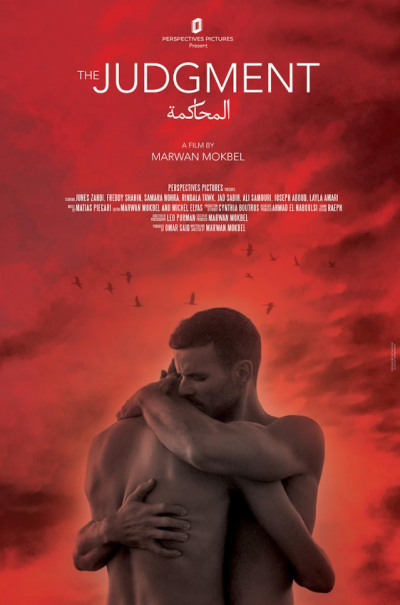
“The Judgment” (Egypt/Lebanon/USA)
(3/5); Letterboxd (3/5), Imdb.com (6/10), TMDB.com (3/5); Web site
When is something sinful, and when is it not? It’s hardly a clear-cut matter; what someone might see as perfectly acceptable is utter heresy for someone else, despite the fact that the same issue is up for debate in each of those cases. And it’s this question that’s explored in writer-director Marwan Mokbel Elessawi’s second feature outing about an Egyptian-American gay couple who visit the homeland to handle a family emergency and end up undergoing a frightening, unexpected supernatural experience. One of the partners, Mo (short for Mohammed) (Junes Zahdi), who has spent most of his life in the US and has had little contact with his family for years, is unaccustomed to the lack of tolerance he experiences compared to his life in America. Yet, despite sincere efforts to maintain a low profile, he soon discovers that there may be those who know about his “sinful” secret – and who seek to inflict evil deeds upon him for his allegedly wicked ways, experiences that prompt Mo to question his own behavior. But aren’t those gestures perpetrated against him innately as evil as what he’s supposedly guilty of? While these sanctimoniously accusatory acts are served up in the guise of witchcraft, the narrative draws upon them as metaphors for the narrow-mindedness of fanatical religious fundamentalism. These incidents thus place the beleaguered protagonist in a position of having to assess his beliefs about himself and what’s unfolding around him, issues that hearken back to his youthful upbringing and prompting him to examine his current behavior. The result is an admirably ambitious effort at exploring the key question raised above. Unfortunately, the picture doesn’t address it as clearly as it might have. While this offering starts out strong and finishes well, it stumbles in the middle, getting caught up in an array of confusing story threads that go on too long and ultimately yield more muddle than riddle. Although the film provides a detailed look at the rites and practices of Egyptian witchcraft, there’s a definite TMI quality about this that doesn’t allow the narrative’s symbolic elements to come across as unobstructed as they might have otherwise. I appreciate the sentiment that this one is going for, but it’s regrettable that it doesn’t carry it off as well as it might have. Indeed, it really is true that less can be more.
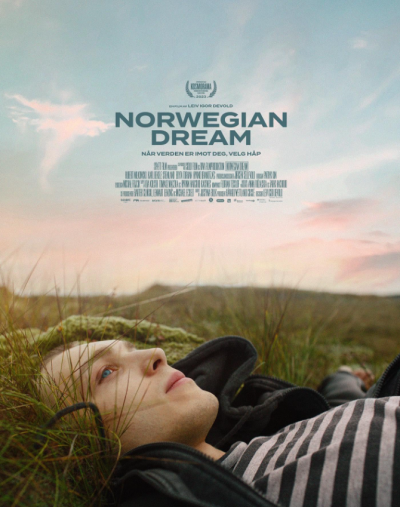
“Norwegian Dream” (Norway/Poland/Germany)
(3/5); Letterboxd (3/5), Imdb.com (6/10), TMDB.com (3/5); Web site Trailer
Coming out stories have become a staple of LGBTQ+ cinema over the years, and, through the years, these offerings have increasingly come to distinguish themselves by incorporating greater and more specific details about the circumstances under which these tales unfold. Adding such context has significantly helped these films establish themselves as stories that go beyond being works of fundamentally basic gay-themed cinema. However, by including these additional narrative elements, it’s become incumbent on the creators of these pictures to seek to harmoniously integrate these supplemental aspects into their stories to make them more complete offerings. Such appears to have been the intent behind director Leiv Igor Devold’s third feature outing, the story of a closeted laborer (Hubert Milkowski) who leaves his native Poland to take a job in Norway, hoping that he’ll find a more tolerant way of life compared to the bigoted attitudes prevalent in his homeland. Upon arrival, however, he finds adjustment difficult, partly because he’s unaccustomed to his newfound freedom and partly because of other challenges faced by immigrant workers, such as the bald-faced disrespect often inflicted on them, issues related to the difficulty involved in union organizing and seeking ways to balance his life in Norway with that of relatives back in Poland. All of these story threads have merit, too, but this release struggles to find an effective degree of integration, prompting the narrative to frequently wander as if lost in the Scandinavian woods. That’s unfortunate, given that all the makings of an engaging story are present here, but they never quite gel into a cohesive whole, leaving viewers wondering exactly what the filmmaker and script writers are actually going for. Granted, the film shines a bright light on the widely held illusion of a “Norwegian dream,” one that sadly seems to mirror its equally illusory American counterpart, but, that consideration aside, this tale ultimately raises more questions than it answers, leaving viewers as unsatisfied as its disillusioned protagonist. Indeed, staying put might not be the wisest decision for someone in need of making a change, but then an alleged panacea might not be the answer either. As ambitious as it might be to try to convey that notion cinematically, some things just don’t work out in the end, as this film illustrates.
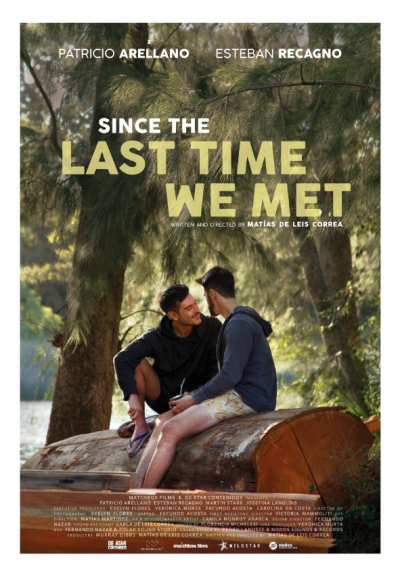
“Since the Last Time We Met” (“Desde la última vez que nos vimos”) (Argentina)
(2/5); Letterboxd (1.5/5), Imdb.com (3/10), TMDB.com (1.5/5); Web site Trailer
If you’re looking for a film about how not to conduct yourself in a gay male relationship, this is it. Writer-director Matías De Leis Correa’s second feature outing is a talky, jumbled mess about the dysfunctional reunion of two long-separated partners (Patricio Arellano, Esteban Recagno) who constantly paw at one another but can’t make up their minds about what they want for the future. In a story that pretentiously deals with the supposed power of love and unrestrained raw emotion, the film ends up being little more than an exercise in whiny, circular, often-contradictory discussions about relationships and responsibility as a precursor to soft-core gay male porn. The picture tries hard to pass itself off as a work of poetic, heartfelt romance but is in actuality little more than slickly produced justification for bad behavior. What’s more, the story grows ever more tedious as it unfolds, straining to evoke sympathy from audience members for the selfish expectations and doormat subservience of its two remarkably unlikable protagonists, plot devices that regularly and increasingly prompt sighs and reactions of “Oh, come on already!” While this release admittedly features some fine camera work of the Argentinean landscape, that’s about all it has going for it. But, considering that this is the work of a filmmaker primarily known for music videos, what can one really expect? This one is easily skipped.
Copyright © 2023, by Brent Marchant. All rights reserved.



